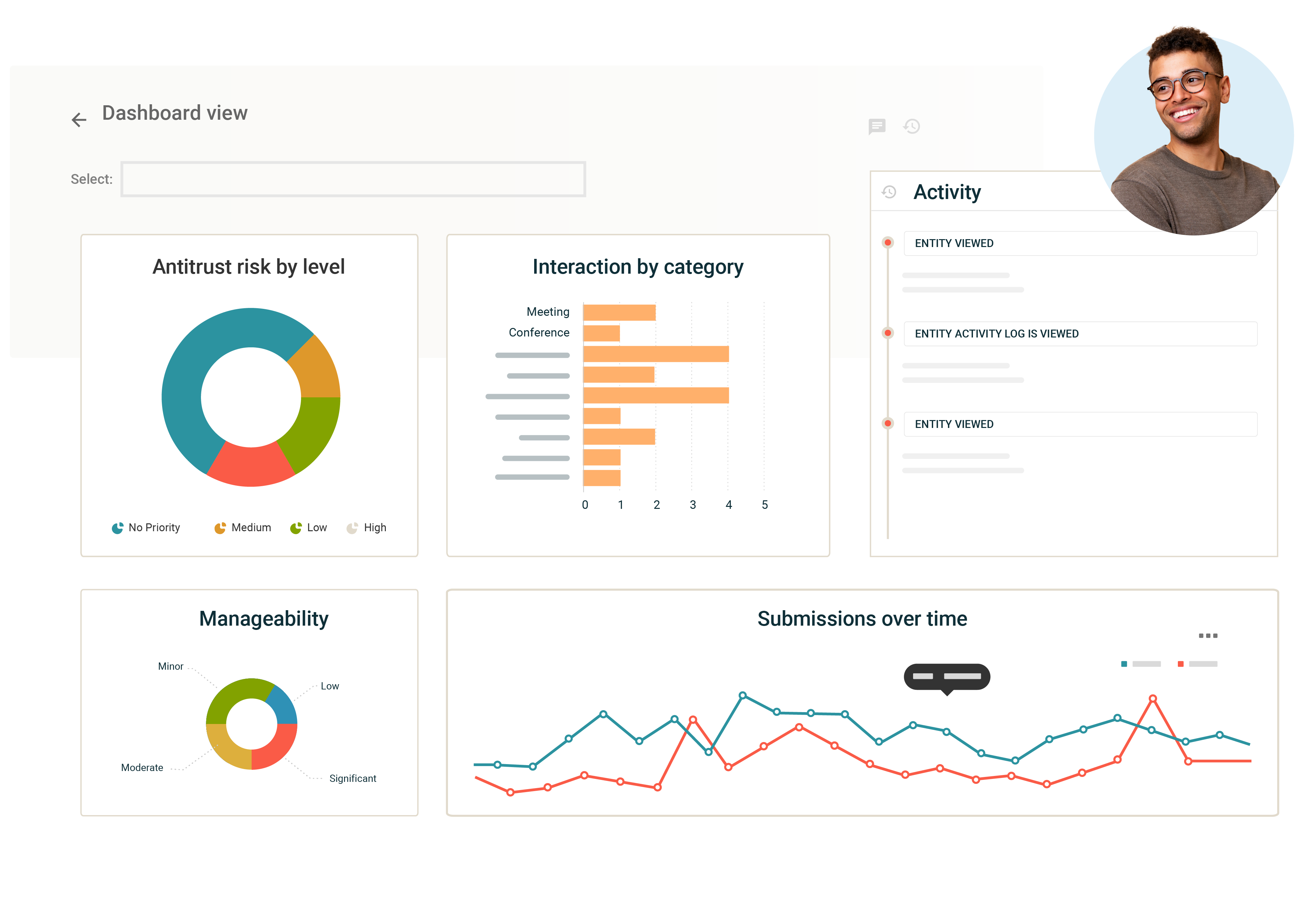Food and Beverage
Food and beverage manufacturing compliance software
Benefit from an integrated, data-driven approach to managing corporate compliance, ethics, and third-party risk – trusted by leading food and beverage companies.

Trusted by the world’s leading food and beverage companies

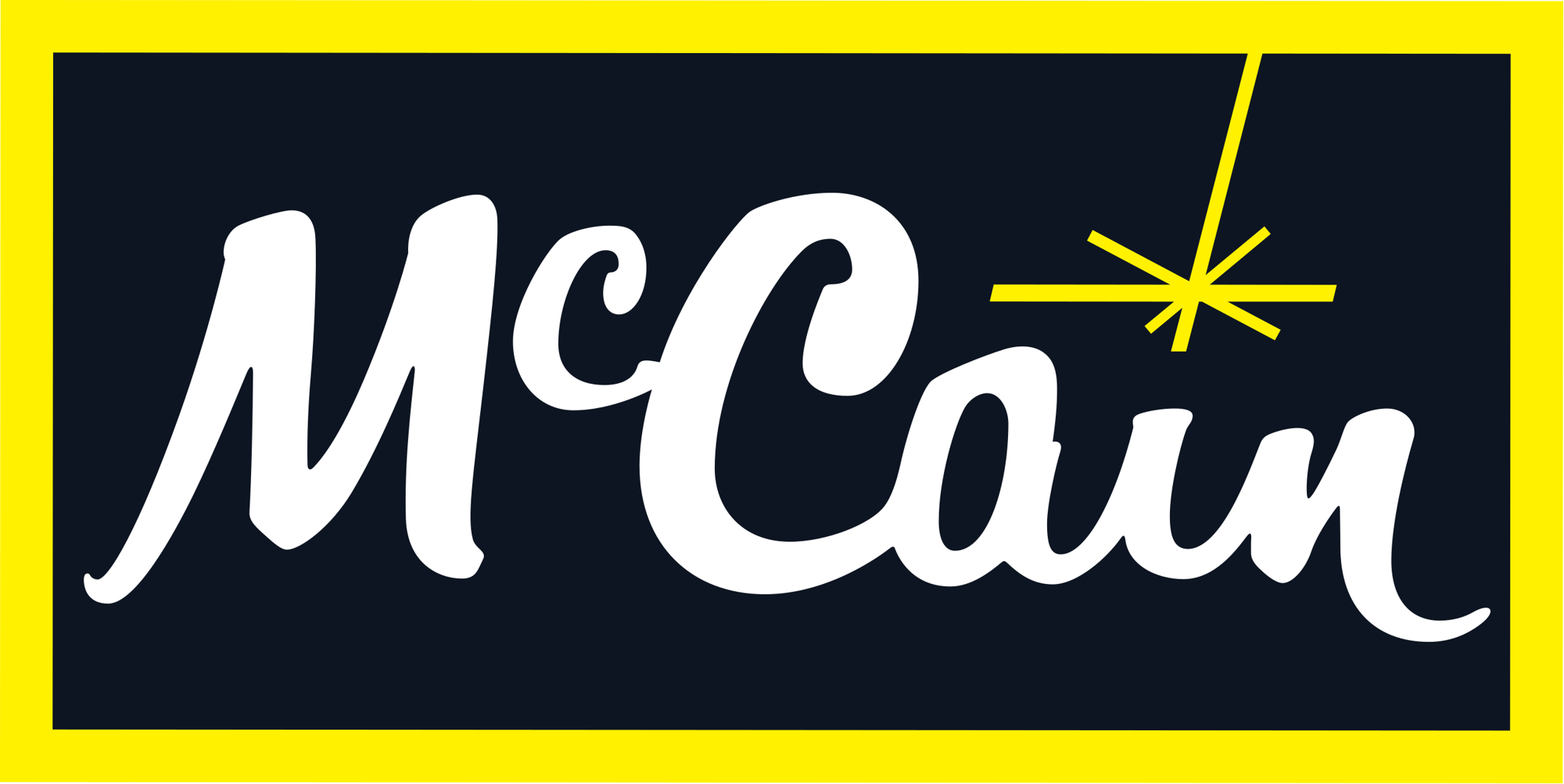
Why leading food and beverage firms rely on GAN Integrity
GAN Integrity is how compliance teams at food and beverage firms get the tools and expertise to stay ahead of risk. With less effort and more reach, you finally get a better way to do your good work. With less effort and more reach, you finally get a better way to do your good work.
See everything – Gain a comprehensive view of overall risk and compliance in one centralized platform for more effective program management.
Adapt to anything – Tailor the platform to your organization, regardless of your tech stack, regions, risk appetite, and other complexities -all without heavy lifting or expense.
Get all the help you need – Receive dedicated support from GAN Integrity’s team of experts.
Compliance challenges for the food and beverage industry

As a compliance professional in the food and beverage industry, you may feel like you’re facing an unfair fight. You must navigate a complex web of regulations from agencies like the FDA and EFSA, as well as laws such as FSMA and the EU General Food Law. Key areas of focus include food safety, sustainability, and supply chain transparency.
You face unique challenges, such as ensuring product safety and quality, adhering to labeling and packaging regulations, managing a vast supplier network, and keeping up with consumer protection and environmental laws. The emphasis on sustainability and ethical sourcing requires monitoring the environmental and social impact of your supply chain.
Key areas of compliance in food and beverage companies
Food and Beverage companies are complex enterprises. There are many areas of compliance, ethics, and risk that need to be managed, spanning everything from Environmental, Social and Governance (ESG), to Food Safety, to Anti-Bribery And Corruption (ABAC). These include:
- ABAC Compliance: Upholding anti-bribery and anti-corruption laws and standards.
- Food Safety: Ensuring all products meet safety standards and are safe for consumer use in compliance with regulations like FSMA and EU General Food Law.
- Labeling and Packaging: Adhering to strict labeling and packaging regulations to ensure consumer transparency and safety.
- Sustainability: Implementing sustainable practices in sourcing, production, and distribution and adhering to environmental regulations.
- Supply Chain Transparency: Ensuring suppliers and partners comply with relevant laws and standards and maintaining visibility into the entire supply chain.
- Data Protection: Safeguarding sensitive information and ensuring compliance with data privacy regulations.
- Ethical Sourcing: Ensuring ethical practices in sourcing and production to meet consumer and regulatory expectations.
- Export Controls: Complying with international trade laws.
- Financial Reporting: Maintaining accuracy and transparency in financial dealings.
- Conflict of Interest Management: Ensuring potential conflicts are disclosed and managed to uphold ethical standards.
- Training: Educating employees about compliance requirements and ethical conduct.
Steps to achieving compliance in the food and beverage industry
Achieving compliance in any organization involves a series of strategic steps:
Compliance in the Food and Beverage Industry
Risk Assessment
Identify potential compliance risks specific to your food and beverage operations.
Objective Setting
Define clear compliance goals that align with your operational objectives.
Documentation
Maintain thorough records of compliance efforts and decisions.
Training
Educate employees about compliance requirements tailored to the food and beverage industry.
Monitoring and Auditing
Regularly review compliance status and adjust practices as needed.
Reporting System
Establish clear channels for reporting issues and disclosures.
Issue Response
Quickly address non-compliance issues to prevent disruptions.
Continuous Improvement
Regularly update compliance practices to stay ahead of regulatory changes.
GAN Integrity for Food and Beverage Companies
GAN Integrity helps food and beverage companies navigate these challenges with a unified, easy-to-use compliance platform that organizes requirements, automates tasks, and provides powerful reporting, making it easier for you to do your good work. With GAN Integrity, compliance teams can see everything, adapt to anything, and get all the help they need.
Disclosure Management
Consolidate your disclosures for conflicts of interest, gifts, travel, entertainment, and political and charitable donations or contributions. Capabilities include:
- Policy management: Develop and enforce comprehensive disclosure policies. Educate and engage your workforce with targeted training and policy attestations.
- Flexible disclosure process: Simplify the submission of potential conflicts of interest with user-friendly forms, ensuring easy access for employees.
- Automated approvals and reviews: Enhance compliance with automated approval and review workflows. Quickly escalate notifications to relevant stakeholders to address potential risks.
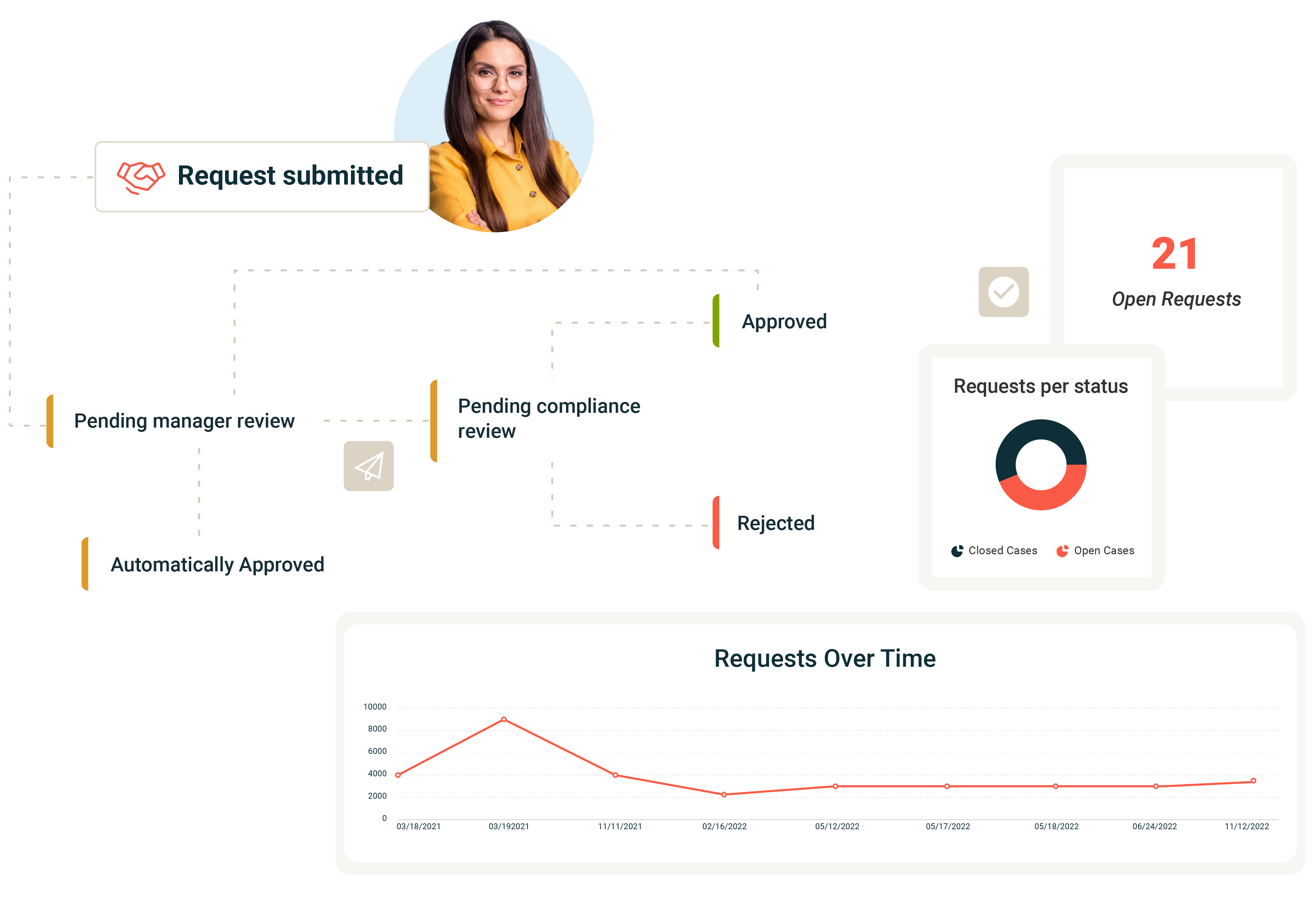
ABAC Program Management
Ensure your organization upholds ethical integrity and ABAC compliance through comprehensive risk assessments, effective policy management, and continuous monitoring. Capabilities include:
- Third-party due diligence: Mitigate bribery and corruption risks with integrated questionnaires, sanctions checks, and risk intelligence data.
- Disclosure management: Consolidate and assess conflicts of interest (COI), gifts, travel, entertainment, and political and charitable contribution disclosures.
- Reporting and documentation: Maintain a complete audit trail and detailed reporting to easily demonstrate compliance to stakeholders and regulators.
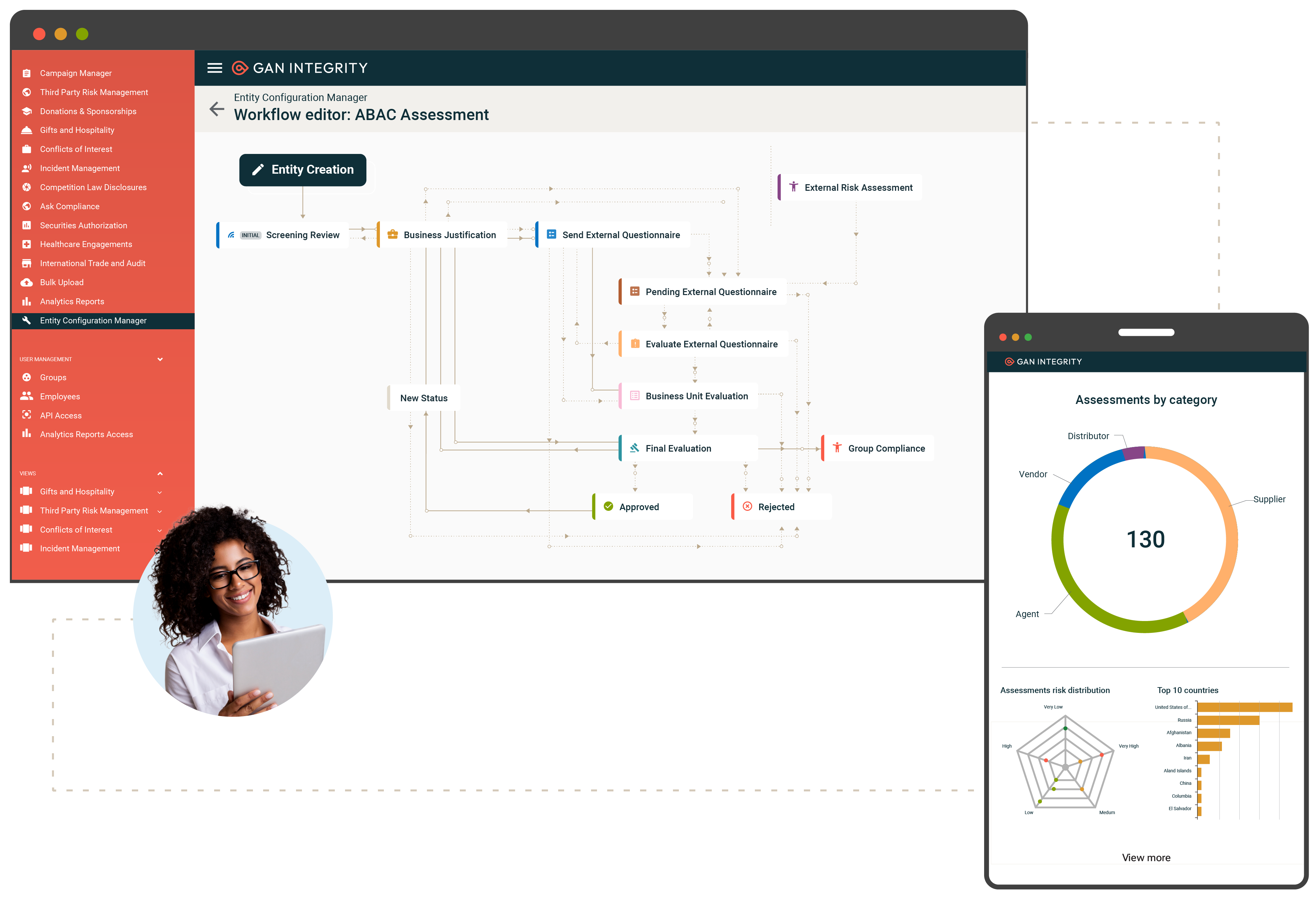
Supply Chain Due Diligence
Enhance supply chain risk management by consolidating processes, identifying and mitigating risks, and integrating data from various risk intelligence and business systems. Capabilities include:
- Automated risk assessments and continuous monitoring: Monitor suppliers continuously for adverse media, sanctions lists, PEP lists, forced labor, and ESG (Environmental, Social, and Governance) issues.
- High-risk supplier identification and management: Identify high-risk suppliers, manage them effectively, and track actions and mitigations to ensure compliance.
- Integrated due diligence assessments: Perform thorough due diligence across your business operations and workflows for seamless integration and enhanced efficiency.
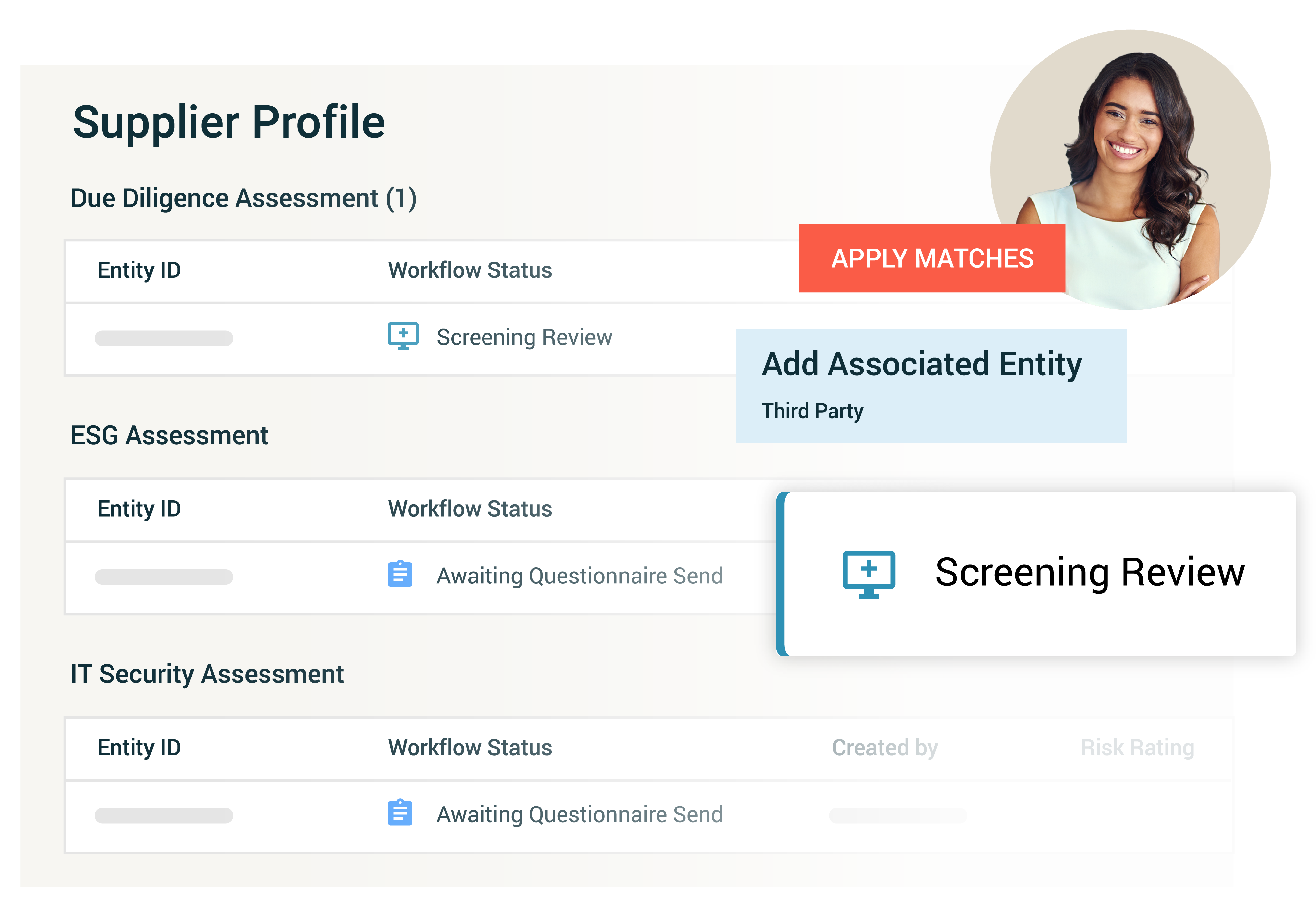
Policy Management
Manage approvals, distribution, and attestation of policies, along with centralized portals for easy access to the latest policies and procedures. Capabilities include:
- Regulatory change management: Identify policies that require updates and timely distribution to employees in response to regulatory changes.
- Automated workflow: Optimize the review and approval process for policies, operating procedures, and work instructions with automated workflows.
- Comprehensive reporting and documentation: Maintain a full audit trail and generate detailed reports to provide clear evidence of compliance to stakeholders and regulators.
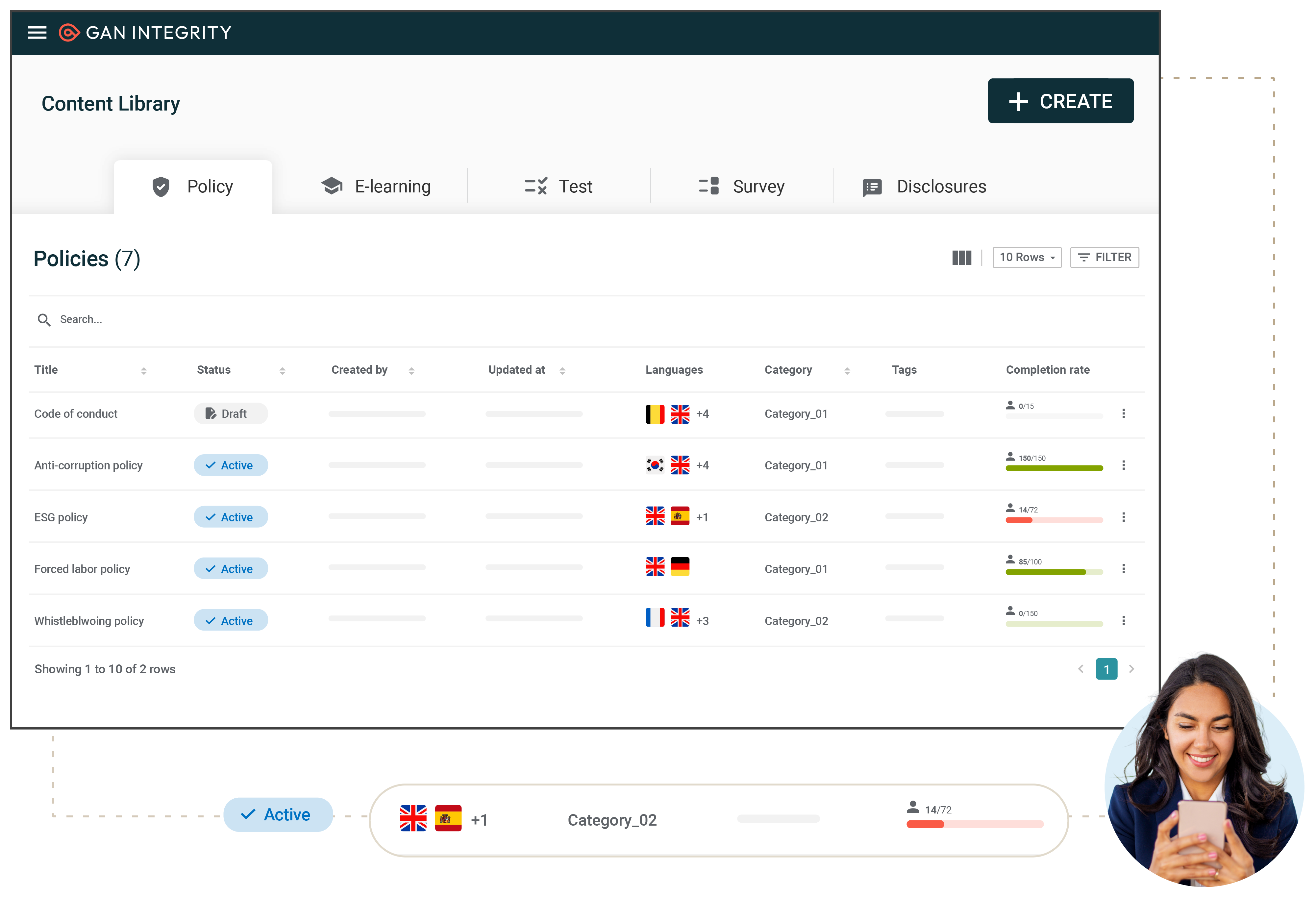
Reporting and Documentation
See everything across your compliance program, and generate reports and dashboards to demonstrate compliance program effectiveness to stakeholders and evidence to regulators. Capabilities include:
- Reporting and analytics: Executive, role-based dashboards to review the effectiveness of your compliance program initiatives.
- Evidence-based compliance: Maintain an auditable trail of all activity with the platform’s integrated and automated audit log.
- Compliance insights: See risk trends and patterns within your program, including third-party and supply chain risk, policies and disclosures.
